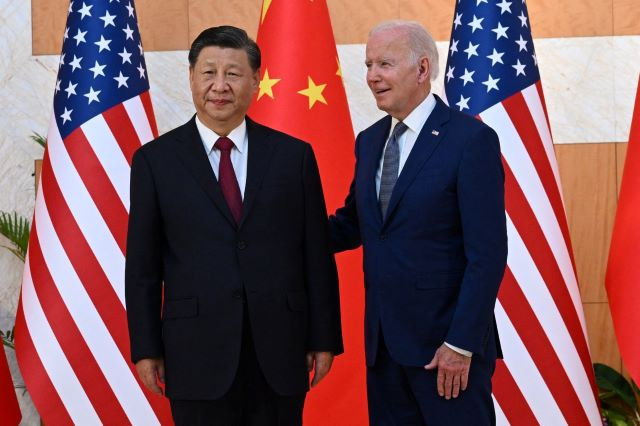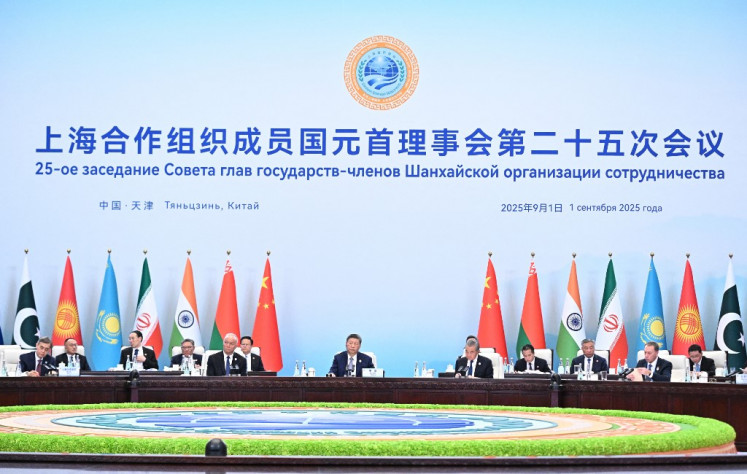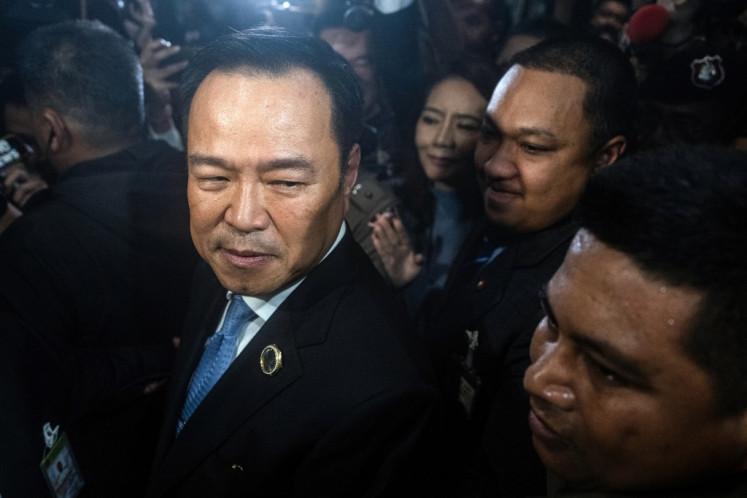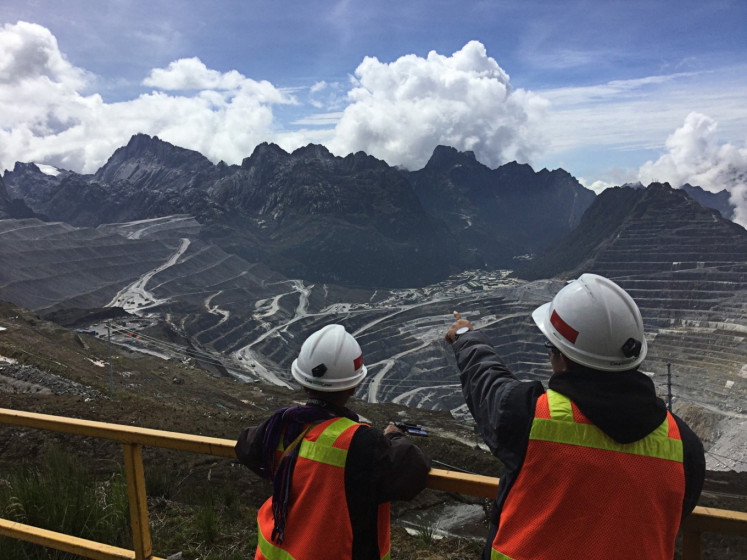Popular Reads
Top Results
Can't find what you're looking for?
View all search resultsPopular Reads
Top Results
Can't find what you're looking for?
View all search resultsThe Xi-Biden summit: Shaping the future
The meeting between President Xi and President Biden highlights the ability of two major nations to manage their differences and maintain stability, even in the midst of fierce competition.
Change text size
Gift Premium Articles
to Anyone
I
n a pivotal move for international diplomacy, Chinese President Xi Jinping is set to meet with his United States counterpart, President Joe Biden, in San Francisco this week. This face-to-face meeting is taking place on the “sidelines” of the 30th APEC Economic Leaders' Meeting, signaling mutual commitment to fostering cooperation in the Asia-Pacific region.
This summit marks a critical juncture where the two world leaders are expected to delve into matters of immense strategic significance, shaping China-US relations, world peace, and global development.
While the global economic landscape grapples with instability and uncertainties, the Asia-Pacific continues to show signs of economic resilience. The Xi-Biden summit is being eagerly anticipated worldwide and it unfolds as the two major global powers navigate through a landscape of intense competition across various sectors.
This upcoming meeting marks the first direct interaction between the two leaders since their previous meeting in November 2022 at the Group of 20 summit held in Bali, Indonesia. During that encounter, they managed to formulate joint resolutions aimed at tempering escalating tensions.
Nonetheless, things took a frosty turn following the President Biden's order to intercept a presumed Chinese espionage balloon that traversed the continental United States and simmering Chinese resentment over a stopover in the US by Taiwan President Tsai Ing-wen earlier this year, among other contentious issues. This was subsequently followed by the US adding over 1,300 Chinese entities and individuals to various sanctions lists, as well as the imposition of punitive tariffs on a large array of Chinese products.
Yet, despite these challenges, recent months have witnessed renewed contact and increased interactions between the US and China at different levels and in various domains. Just recently, Chinese Vice Premier He Lifeng met with US Treasury Secretary Janet Yellen in San Francisco, marking their second in-person discussion in four months.
This dialogue exudes a relatively moderate atmosphere, underscoring the recent upswing in bilateral relations. Furthermore, the thawing of frozen talks on arms control and nonproliferation and a constructive dialogue on climate change signify a positive shift in the bilateral relationship.
In late October, Chinese Foreign Minister Wang Yi journeyed to Washington for extensive discussions with Secretary of State Antony Blinken and President Biden, seemingly setting the stage for the upcoming Xi-Biden summit.
These prominent Chinese overtures in the lead-up to the APEC summit signal a sincere attempt by China to revive relations with the US. For this complex yet critical relationship, the face-to-face meeting between two leaders is of paramount importance. It is a juncture that could lead to a stable future built on mutual benefit and cooperation, or veer us closer to a new Cold War.
As the summit nears, the expectation is that the US will keep the channels of communication open, reinforcing existing mechanisms and exploring new approaches in the realms of climate change and fentanyl control.
It is imperative to recognize that while both parties strive for amicable relations, there remain issues of contention, such as the Taiwan question and the South China Sea dispute. China remains steadfast in its stance and is not expected to mollify its stance on these matters. China's determination to stabilize ties demonstrates a profound sense of responsibility.
Today’s global challenges, ranging from drug control to climate change, and conflicts in various regions, necessitate collaboration between China and the US. It is an irrefutable truth that tackling these issues is virtually impossible without the two major powers working together.
The meeting between President Xi and President Biden sends an encouraging message to the world. It highlights the ability of two major nations to manage their differences and maintain stability, even in the midst of fierce competition.
Yet, there have been actions by the US that have given rise to concerns in China and disrupted the global economy. These include restrictions on Chinese companies, the imposition of punitive tariffs, and military operations conducted alongside allies in proximity to Chinese territories.
This summit presents a unique opportunity for both countries, as major global powers, to embrace their responsibilities and collaboratively tackle the urgent challenges that affect the world. Such cooperation is paramount, particularly in the context of the Asia-Pacific region and a global landscape grappling with economic stagnation and an array of pressing issues.
The global political stage is marked by intermittent hotbeds of tension, exemplified by the Ukraine conflict and the Israel-Palestine conflict, each carrying the risk of escalating into worldwide conflagrations. The problem is that on all these global hotspots, both sides have extremely divergent views.
Biden and Xi will likely delve into discussions regarding the Israel-Hamas conflict, Russia's actions in Ukraine, and the impending presidential election in Taiwan. Such dialogues serve as a crucial buffer to prevent misunderstandings from escalating into conflicts.
They also play a pivotal role in strategizing responses to rapidly developing or evolving crises, like preparing for potential escalations in the Israel-Hamas war or strategizing for post-conflict reconstruction in Ukraine.
As President Xi embarks on his visit to the US, it offers a chance to steer the China-US relationship, which stands as the world's most critical bilateral tie, toward stability and improvement. The summit holds the promise of translating consensus into tangible actions and solidifying the foundations of this pivotal partnership.
This meeting is not only a watershed moment for China-US relations but also a testament to the power of diplomacy in a world in constant flux. The potential for amicable relations between these two global giants presents an opportunity to address the pressing issues of our time and foster greater stability in our ever-changing world.
Striking a balance between collaboration and competition should be the paramount objective of this summit. Both leaders have the opportunity to send a positive message to the world.
This message conveys that, despite fierce competition, the two major powers can steer their relationship towards stability and manage their differences judiciously. Indeed, it is during times of turbulence and adversity that true leadership emerges.
This summit in San Francisco may very well usher in a new era of cooperation and partnership between China and the US.
***
The writer is a columnist on international relations based in Karachi, Pakistan.











